I have tried searching on Google, only to find nothing.
And it seems the manual also doesn't work.
Here is my code:
account.h
#include <string>
#include "Date.h"
class SavingsAccount
{
public:
void show();
void deposit(Date now_date, double money, string ways);
void withdraw(Date now_date, double money, const char* ways);
void settle(Date new_date);
SavingsAccount(Date date_new, const char* id_new, double rate_new);
void accountshow();
static double getTotal();
static SavingsAccount* point;
static int sum_account;
static double sum_money;
private:
const char* id;
double balance = 0;
double rate = 0;
int lastDate = 0;
Date date;
double interest = 0;
};
account.cpp
#include <iostream>
#include <string>
#include "account.h"
#include "Date.h"
using namespace std;
double SavingsAccount::sum_money = 0;
void SavingsAccount::deposit(Date now_date, double money, string ways) //<--- here is the problem
{
interest += balance * (now_date - date) * rate / 366;
date = now_date;
date.show();
cout << "\t#" << id << "\t" << money << "\t" << money + balance << "\t"<<ways << endl;
balance += money;
sum_money += money;
}
void SavingsAccount::withdraw(Date now_date, double money, const char* ways) //取款
{
interest += balance * (now_date - date) * rate / 366;
date = now_date;
date.show();
cout << "\t#" << id << "\t-" << money << "\t" << balance - money << "\t" << ways << endl;
balance -= money;
sum_money -= money;
}
void SavingsAccount::settle(Date new_date) //结算利息
{
interest += balance * (new_date - date) * rate / 366;
interest = (int(interest * 100 + 0.5)) / 100.0;
sum_money += interest;
date = new_date;
date.show();
cout << "\t#" << id << "\t" << interest << "\t" << interest + balance << " interest"<<endl;
balance += interest;
interest = 0;
}
void SavingsAccount::accountshow()
{
this->date.show();
cout << "\t" << "#" << id << " created" << endl;
}
void SavingsAccount::show()
{
cout << id << "\tBalance: " << balance;
}
SavingsAccount::SavingsAccount(Date date_new, const char* id_new, double rate_new) : id(id_new)
{
date = date_new;
rate = rate_new;
//sum_account++;
balance = 0;
interest = 0;
accountshow();
}
double SavingsAccount::getTotal()
{
return sum_money;
}
bank.cpp:
#include "account.h"
#include <iostream>
using namespace std;
int main()
{
Date date(2008, 11, 1);
SavingsAccount accounts[] = {
SavingsAccount(date, "S3755217", 0.015),
SavingsAccount(date, "02342342", 0.015)
};
const int n = sizeof(accounts) / sizeof(SavingsAccount);
string works = "salary";
accounts[0].deposit(Date(2008, 11, 5), 5000, works);
accounts[1].deposit(Date(2008, 11, 25), 10000, "sell stock 0323");
accounts[0].deposit(Date(2008, 12, 5), 5500, "salary");
accounts[1].withdraw(Date(2008, 12, 20), 4000, "buy a laptop");
cout << endl;
for (int i = 0; i < n; i++) {
accounts[i].settle(Date(2009, 1, 1));
accounts[i].show();
cout << endl;
}
cout << "Total: " << SavingsAccount::getTotal() << endl;
return 0;
}
Because of the limited length for this, I did not show the Date.h and Date.cpp, and there is nothing wrong with it. But I will show it to you if you need.
Here is the problem, and I translate the error the VS tells me into English:
VS also says:
'void SavingsAccount::deposit(Date,double,std::string)' there is no overloading member function declared in
SavingsAccount
But when I replace the string by const char*, just like what I write in the withdraw() function, it works without any problem.
So, could you please tell me how can I use string to finish this problem? Because const char* is so uncomfortable to be used.

